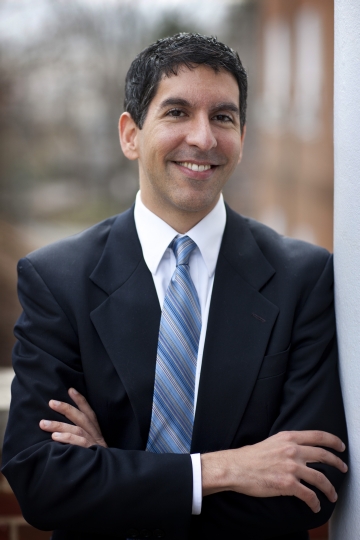A University of Virginia music scholar will spend the next academic year working among a select group of humanities researchers at the National Humanities Center in Raleigh, N.C., the organization announced today.
Michael J. Puri, an associate professor in the McIntire Department of Music in U.Va.’s College of Arts & Sciences, is among 36 scholars selected from a pool of 433 applicants for a yearlong fellowship, according to the NHC. Puri said he’s looking forward to the fellowship, which runs during the 2013-14 academic year.
“Their objective is to create a community of scholars who learn from each other while pursuing their own research,” he said of the NHC. “They not only provide a comprehensive array of resources to help you with your project, but also sponsor a series of seminars, lectures and conferences in which the fellows can share their work with each other and benefit from the feedback.”
Puri will use the time at NHC to work on a new book project on Maurice Ravel, a turn-of-the-century French composer who was also the subject of Puri’s first book, “Ravel the Decadent: Memory, Sublimation, and Desire.”
Puri is the 15th U.Va. faculty member selected as a fellow since the center opened in 1978, and is the fourth selected in the past five years. A complete list of past fellows is available on the NHC website. This year, the fellows are drawn from humanistic fields including history, literature, philosophy, anthropology, art history, classics, musicology and religion.
The tentative title for Puri's new book is “Ravel the Cosmopolitan,” which explores the degree to which Ravel’s music – usually treated as a quintessentially French artistic product – drew deeply and broadly on international influences.
“As a composer, Ravel combined a transnational practice with a cosmopolitan ethos,” Puri said. “He not only assimilated other national musical traditions into his art, but also advocated in his lectures, essays and correspondence that other composers do the same. By recognizing the increasing infringement of the global upon the local as an unavoidable consequence of modernity and by embracing it the way he did, Ravel becomes a linchpin in our understanding of modernism.”
In the book, Puri will delve into Ravel’s extensive and complex relationship with the work of four non-French composers: Richard Wagner, Richard Strauss, Franz Liszt and Igor Stravinsky.
“Although each of these composers differs from another, all four represented something very attractive for Ravel,” Puri said. “All had unique styles and expressivities that compelled Ravel to import their music across national-cultural boundaries and incorporate these musics into his own.”
Having the opportunity to work at the National Humanities Center offers the chance to both hone his own scholarship and draw on the wisdom of scholars with expertise in other fields, Puri said.
“I anticipate that the learning curve will be rather steep as we come to understand each other's points of view,” he said. “The fields and methods of inquiry will probably differ considerably from one scholar to another, but this difference can only further the main goal: to be inspired to think new thoughts.”
Media Contact
Article Information
April 22, 2013
/content/uva-music-scholar-use-national-humanities-center-fellowship-study-ravel

